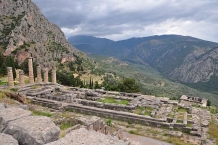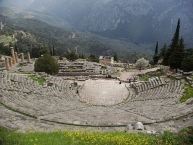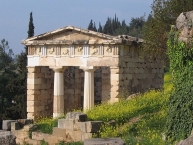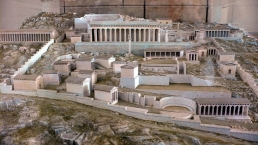Delphi
Sehenswürdigkeiten
Erstellt am 23.10.2014,
zuletzt geändert von biroto-Redaktion am 23.10.2014
Radwege und Fahrrad-Touren in der Nähe
| Name/Bezeichnung | Typ | km zur Strecke |
|---|---|---|
EuroVelo: Mittelmeer Route Griechenland ursprüngliche Wegführung | Route | 0,2 km |
![]()
Bitte warten - Kartendaten werden geladen
Art der Sehenswürdigkeit
Historische(s) Gebäude / Weltkulturerbe
Name u. Anschrift
Delphi
GR-330 54 Delphi
GEO-Daten
GEO-Koordinaten
38.48∎∎∎∎ 22.50∎∎∎∎
Höhe
577 m
Kommunikation
Informationen zu Urheber-Rechten | |
|---|---|
Rechte-Inhaber | commons.wikimedia.org/w/index.php?title=User:Helen_Simonsson |
Rechte-Ausprägung / Lizenz | by-sa: CREATIVE COMMONS Namensnennung, Weitergabe unter gleichen Bedingungen |
Link zur Rechtebeschreibung | |
Bild übernommen aus | |
Bild hochgeladen | durch biroto-Redaktion am 23.10.2014
|
Informationen zu Urheber-Rechten | |
|---|---|
Rechte-Inhaber | |
Rechte-Ausprägung / Lizenz | cc0: Public Domain keine Rechte vorbehalten |
Link zur Rechtebeschreibung | |
Bild übernommen aus | commons.wikimedia.org/wiki/File:EHGritaly_120305-09_(Theater_of_Delphi_1).JPG |
Bild hochgeladen | durch biroto-Redaktion am 23.10.2014
|
Informationen zu Urheber-Rechten | |
|---|---|
Rechte-Inhaber | |
Rechte-Ausprägung / Lizenz | by-sa: CREATIVE COMMONS Namensnennung, Weitergabe unter gleichen Bedingungen |
Link zur Rechtebeschreibung | |
Bild übernommen aus | |
Bild hochgeladen | durch biroto-Redaktion am 23.10.2014
|
Informationen zu Urheber-Rechten | |
|---|---|
Rechte-Inhaber | |
Rechte-Ausprägung / Lizenz | by-sa: CREATIVE COMMONS Namensnennung, Weitergabe unter gleichen Bedingungen |
Link zur Rechtebeschreibung | |
Bild übernommen aus | |
Bild hochgeladen | durch biroto-Redaktion am 23.10.2014
|
Delphi (griechisch Δελφοί (m. pl.), altgriechisch Delphoí ausgesprochen) war eine Stadt im antiken Griechenland, die vor allem für ihr Orakel bekannt war. Heute gehören die Ausgrabungen von Delphi zur Liste des Weltkulturerbes der UNESCO.
Westlich der Ruinen des antiken Delphi befindet sich die moderne Kleinstadt Delfi .
Ausgrabungen
Das Ausgrabungsgelände von Delphi erstreckt sich über 300 Höhenmeter am Hang und ist nicht zuletzt durch seine landschaftliche Schönheit für Besucher attraktiv. Die wichtigsten Funde (darunter die Statue des Wagenlenkers von Delphi und der Omphalos) sind heute im archäologischen Museum von Delphi direkt neben dem Ausgrabungsgelände ausgestellt. Auf dem Areal des Heiligtums wurde eine einfache Kopie des Omphalos errichtet.
Heilige Straße
Die Heilige Straße führt zum Tempel des Apollon und wird von den Schatzhäusern gesäumt, die die griechischen Staaten zur Aufbewahrung ihrer Weihgeschenke errichteten. Das heute rekonstruierte Schatzhaus der Athener wurde in der Zeit zwischen 510 und 490 v. Chr. in der Form eines Antentempels im dorischen Baustil erbaut.
Apollon-Tempel
Vom Apollon-Tempel, dem Sitz des Orakels, wurden sechs der ursprünglich 38 dorischen Säulen wieder aufgerichtet. Der Tempel wurde errichtet, nachdem der Vorgängerbau 373/372 v. Chr. durch ein Erdbeben und einen Felssturz zerstört worden war. Für diese Zeit ist seine Form von 6 Säulen auf den Fronten und 15 auf den Langseiten ungewöhnlich langgestreckt, was sich aber dadurch erklärt, dass man den Grundriss des Vorgängerbaus aus dem 6. Jahrhundert v. Chr. übernahm. Im Adyton, dem Allerheiligsten des Tempels, saß die Pythia auf einem Dreifuß über einer Erdspalte, aus der ethylenhaltige Gase austraten. Die Dämpfe versetzten die Pythia in einen Trancezustand, in dem sie die Orakelsprüche des Gottes verkündete, welche dann von Priestern den fragenden Gläubigen übermittelt wurden.
Theater
Oberhalb des Heiligtums liegt das Theater, das etwa 5000 Zuschauern Platz bot. In dem Bau aus dem 4. oder 3. Jahrhundert v. Chr. fand der musische Teil der pythischen Spiele statt. Die sportlichen Wettkämpfe wurden im noch weiter hangaufwärts gelegenen Stadion ausgetragen.
Kleinere Heiligtümer
Im unteren Bereich des Ausgrabungsgeländes liegt das Heiligtum der Athena Pronaia mit der Tholos , einem Rundtempel aus dem 4. Jahrhundert v. Chr. Drei der einst 20 dorischen Säulen sind rekonstruiert worden, was die Tholos zu einem beliebten Fotomotiv macht.
Etwas abseits liegt die Kastalische Quelle , woraus zu trinken nach der antiken Sage die Dichtergabe verlieh.
Im Jahr 1905 wurde von E. Bourguet eine in Delphi gefundene, aus mehreren Bruchstücken bestehende griechische Inschrift mit dem Namen Gallio veröffentlicht. Mit hoher Wahrscheinlichkeit handelt es sich um Lucius Iunius Gallio Annaeanus, einen Bruder des römischen Philosophen Seneca, der von 51/52 bis 52/53 Prokonsul von Achaja mit Sitz in Korinth war. Der Fund ermöglichte die Datierung des Aufenthaltes des Apostels Paulus in Korinth (Apostelgeschichte 18,12-17).
Informationen zu Urheber-Rechten | |
|---|---|
Rechte-Ausprägung / Lizenz | by-sa: CREATIVE COMMONS Namensnennung, Weitergabe unter gleichen Bedingungen |
Link zur Rechtebeschreibung | |
Text(e) übernommen von: |
Seite „Delphi“. In: Wikipedia, Die freie Enzyklopädie. Bearbeitungsstand: 2. September 2014, 15:45 UTC. URL: http://de.wikipedia.org/w/index.php?title=Delphi&oldid=133657328 (Abgerufen: 23. Oktober 2014, 13:54 UTC) |
übernommen / bearbeitet am | 23.10.2014
|
übernommen / bearbeitet durch |
|
Radwege und Fahrrad-Touren in der Nähe
| Name/Bezeichnung | Typ | km zur Strecke |
|---|---|---|
EuroVelo: Mittelmeer Route Griechenland ursprüngliche Wegführung | Route | 0,2 km |
Erstellt am 23.10.2014,
zuletzt geändert von biroto-Redaktion am 23.10.2014




